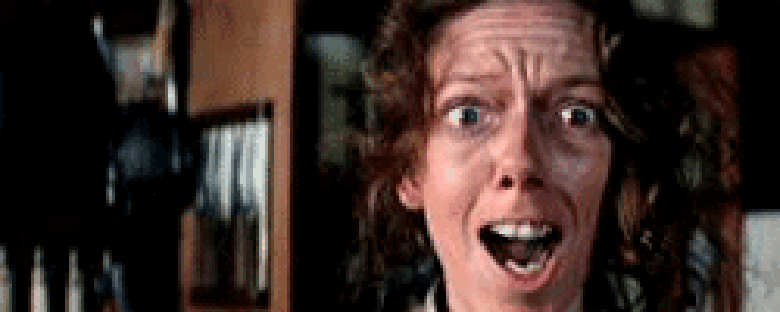Reviews
William Girdler
USA, 1976
Credits
Review by Thomas Scalzo
Posted on 05 October 2006
Source Shriek Show DVD
Related articles
Feaures: 31 Days of Horror
Out of the dark forest it comes—huffing, snorting, its foot-long claws scraping the earth, its two-ton frame lumbering inextricably forward. By the time you turn at the unexpected sounds — thick branches snapping; guttural, menacing growls — it’s too late. You cannot run, you cannot fight—there is no escape: you are in the grip of ursus arctos horribilis—the grizzly.
One of the most impressive independent horror films of the ’70s, this “Jaws with claws” feature, directed by the great William Girdler (the man behind The Manitou and Day of the Animals, among others), tells the tale of a bloodthirsty grizzly bear on the prowl in the woods of Georgia. Long thought to be exterminated round those parts, the killer bear stuns the locals by indulging in an unquenchable crusade for human — and, more often than not, female — flesh.
Hard pressed to stop the slaughter, the top forest ranger in the area, a maverick named Kelly, enlists Scott, a talented naturalist and bear expert, and Tom, a drawling helicopter pilot, to help him track the beast, and plan an effective end to its reign of terror. Despite their collective efforts, however, the bear continues to get the best of them, striking time and again when least expected, and prompting Kelly to surmise that the grizzly is not simply a mindless killing machine, but an intelligent monster, toying with the puny humans who dare venture into its domain.
Like its famous fishy forbearer, Grizzly approaches the when-nature-attacks horror subgenre attempting to do more than graft a series of gory death scenes onto a mindless storyline. Indeed, we have a believable tale of terror brought to life by a director with talent working with an efficient script and competent players. Unlike countless nature-run-amok films, Grizzly features no talk of radiation-mutated beasts, technologically enraged monsters, or nature taking revenge on encroaching humanity. Instead, it’s just a bear in the woods, hungry, relentless—capable of appearing out of the dark with hardly a sound, and tearing people apart without hesitation. It’s a horrific scenario, relatable to anyone who has ever gone for a walk in the woods or spent a weekend camping out under the stars.
Girdler does an excellent job realizing the latent horror of this set up, crafting some terrifically gruesome and shocking death sequences that rival many of Spielberg’s macabre moments. During these scenes of grizzly fury, the multi-ton menace swiftly snatches up his prey and effortlessly detaches arms, legs, and even heads, before settling in to feed. We are also treated to some tense pre-attack moments, with Girdler routinely shifting the camera to the bear’s point of view, and allowing us to follow along as the beast weaves through thick tree trunks, nudges aside slender bushes, and takes the few final steps toward his unwary prey. We see the victims wheel around at the unexpected noise, watch as their eyes go wide with fear, and shudder as they are efficiently devoured. As Girdler limits our initial views of the grizzly to mere glimpses through the trees, we are forced to imagine the horrendous size and power of the killer—a decision that adds materially to the horror.
Of course, this being a Jaws-inspired horror film, the root of all these grisly deaths is not the bear itself, but human arrogance. To wit, we have a callous man-in-charge figure, the power-hungry park supervisor, who is determined to keep the recreation destination open, and thereby forgo camper safety, just to prove his competence to the powers that be in Washington. Then we have Ranger Kelly himself, who, although certainly concerned for the welfare of the numerous backpackers, doesn’t press for full park closure until over half a dozen souls have fallen prey to the grizzly’s rampage. The reasons behind Kelly’s reticence are manifold, but at the center of his motivation is an unwillingness to admit failure—a stubborn streak that ultimately costs many lives. Even Scott, the likeable naturalist, grossly underestimates the ferocity of the grizzly’s rage, and pays dearly for it.
The result of such honest characterizations is a film with no clear heroes, and no sharp lines drawn between good and evil. Even the wonderful helicopter-chase-and-bazooka-firing climax, while certainly providing a semblance of closure in terms of plot, does not deign to offer any idealistic aphorisms about the ultimate relationship between humans and nature, and does not pass judgment on whether the bear or the men are more to blame for the carnage. Like all great directors of horror, Girdler is content to set the stage, introduce believable characters confronted with a terrible, and frighteningly possible, situation, and let the horror of the tale speak for itself.
We don’t do comments anymore, but you may contact us here or find us on Twitter or Facebook.



